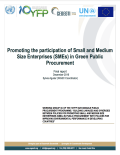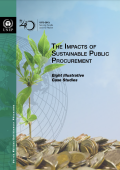
The overall objective of this study is to present the Republic of Korea’s green public procurement (GPP) impact measurement methodology, to compare it to others used by other public authorities internationally, and to pilot a macro-economic analysis of the economic and environmental impacts of the Republic of Korea’s GPP policy in order to improve the approaches used by the government to estimate GPP impacts and benefits. Also, it provides guidance to governments reforming their GPP policies and measurement approaches.

This report explores the contextual factors that influence the design of China’s national emissions trading scheme (ETS) and affect its performance.
This document should be considered part of a package of Dossiers (and Annex) assessing existing pathways towards climate neutrality in order to pursue the objectives of the 100% Renewables Cities and Regions Roadmap project, as well as support Local Governments (LG) wanting to set a 100% Renewable energy target.

This report includes information on the barriers that SMEs face to take part in green public procurement as well as recommendations on addressing the barriers to SMEs' integration in GPP to meet environmental benefits while improving SMEs environmental performance.

This study addresses the lack of assessment of SPP activities by analysing eight SPP contracts to contribute to the development of an impact evaluation methodology. The selected case studies, from developed and developing countries, demonstrate the tangible and measurable impacts of sustainable public procurement, and its support towards the achievement of economic, social, and environmental goals.
